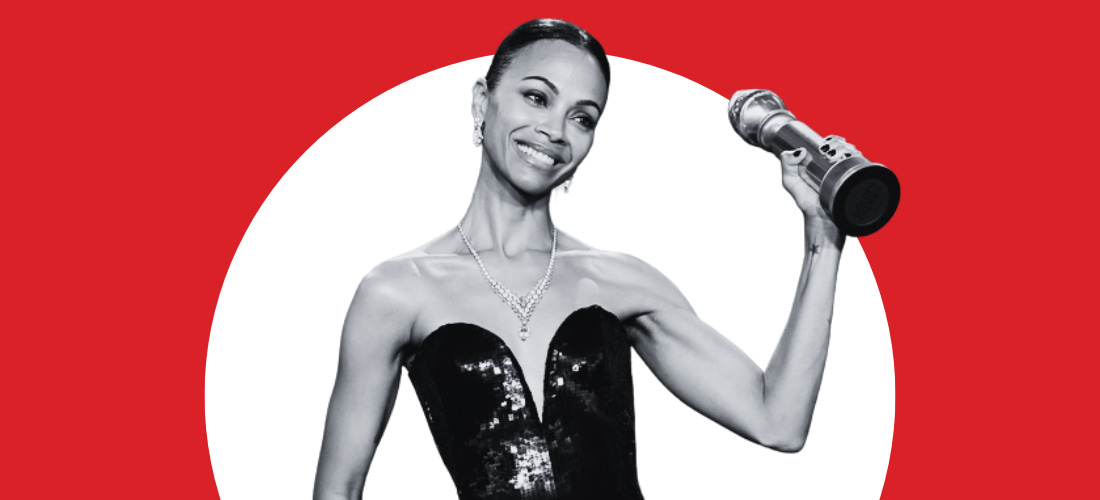Globes: What the Wins, Snubs & Speeches Mean for Oscar (and Not)
I analyze the stagecraft at the Beverly Hilton and the after-party chatter at Netflix and NBCU

Several hours into Netflix’s post-Golden Globes party at Spago in Beverly Hills, a round of applause and cheers erupted near the entrance. I didn’t even have to turn around to know it was Zoe Saldaña, having changed into a new ballgown but still clutching her trophy for her supporting turn in Netflix’s major awards season hopeful, Emilia Pérez.
Saldaña’s emotional acceptance speech had set the tone for a ceremony full of sincere thank-yous, a few sprinkles of tears and even a speech that called Wicked — a film about rising fascism in a fantasy world — a “radical act of optimism.”
The Golden Globes, as my colleague Richard Rushfield has tirelessly reported, are rife with problems, handed out by a group of journalists with ill-defined ties to the movie industry. The award given to Wicked, for cinematic and box office achievement, was invented ahead of last year’s ceremony as a fairly transparent effort to get bigger stars to the Beverly Hilton — and it worked!
But then again, all awards are made up, of course. The Oscars may be more revered than the Palm Springs International Film Festival’s International Star Award (a real thing) or the Golden Globe International Icon Award in Turkey (also real), but they too were once just a glint in Louis B. Mayer’s eye. Awards become real because stars treat them as if they’re real — and it was plainly evident last night that the Globes, for better or worse, remain just about as real as it gets for the winners clutching them.
Not only that, but the RC Cola of spectacles got a lot of things right this year. That’s excluding the TV side, which so thoroughly rubber-stamped last fall’s Emmy winners that the after-party speculation was that the Globes’ new, larger group of voters doesn’t really watch TV at all. Worthy wins for Shōgun’s Tadanobu Asano and The Penguin’s Colin Farrell aside, the TV awards felt so repetitive it wasn’t a surprise that The Bear winner Jeremy Allen White didn’t bother to show up.
(Of course, the Globes being the Globes, there had to be something tacky, like the studio leaderboard projected on the side walls but invisible to the viewers at home.)
For the movies, though, the Globes voters made almost universally solid choices, from consensus contenders to total curveballs. Saldaña’s win for Emilia Pérez had been predicted by plenty of pundits, but as you could tell from her emotional response, it felt like far from a sure thing. I’d still call Ariana Grande a strong Oscar competitor as Wicked continues to rule the world, but the shift in energy after Saldaña’s speech was unmistakable: The Golden Globe win has made her the one to beat.
Same goes for Kieran Culkin, who — with a performance in A Real Pain that was the talk of Sundance a year ago — could now be on a smooth sail toward an Oscar victory, like best supporting actor winners Ke Huy Quan or Troy Kotsur in recent years. I’ve still got my eye on Edward Norton for A Complete Unknown, but a victory for Culkin at the Critics Choice Awards on Jan. 12 could make his Oscar start to feel inevitable.
Then there’s Demi Moore, who had the evening’s best speech accepting a Globe for her role in The Substance, recalling a decades-old insult and how deeply it had gotten under her skin over the years. “Thirty years ago I had a producer tell me I was a popcorn actress. At that time, I made that mean that this wasn’t something I was allowed to have,” she said, cradling her statue in awe.
Moore’s category, best actress in a musical or comedy, was the night’s most competitive and likely contained most if not all of the actresses who will wind up with Oscar nominations. Though The Substance had its excellent box office run in the fall, Moore’s awards campaign has cannily been peaking much more recently, with standout appearances in the Hollywood Reporter actress roundtable and W’s Best Performances and a visit to the Palm Springs Film Festival just days before the Globes. For months Moore has seemed to be on the bubble of making the Oscar best actress five; I’d say last night’s speech cements her spot.
Vulture’s Kathryn Van Arendonk gets it:
I Stan Surprise Wins
Not all of last night’s winners will wind up with an Oscar nomination — but that’s just another reason why the Globes matter, despite it all. Sebastian Stan was nominated twice last night, in drama for The Apprentice and comedy for A Different Man. This self-competition might make it difficult for him to snag an Oscar nomination in the end.
But his victory for A Different Man, a small A24 release that far too few people have seen, was a crucial spotlight for that film and his work in it, and his speech made it clear how much that recognition meant to him. Like Saldaña and Moore, Stan has made a lot of successful movies without garnering a lot of personal acclaim. The Globes, for all their faults, changed that.
I was thrilled for Stan but practically leapt out of my chair when Fernanda Torres won the best actress in a drama trophy for I’m Still Here, the brilliant Brazilian film from Walter Salles that hinges on Torres’ ferocious performance. (Read more about it in my conversation with Salles, Torres and co-star Selton Mello from last week.)
The Oscar race for best actress, as I keep writing, is maddeningly competitive, and it’s hard to know if Torres’ victory here over contenders like Angelina Jolie and Nicole Kidman means anything for Academy voters’ taste. But I’m Still Here just grabbed the spotlight at a crucial moment: Oscar nominations voting begins Wednesday.
A few other contenders also got well-timed boosts. Atticus Ross and Trent Reznor won a Globe for their unconventional Challengers score, which might now be able to find a spot at the Oscars alongside more traditional competitors. The Brutalist won in three categories where it is also virtually guaranteed Oscar nods — best picture, best director and best actor (for Adrien Brody) — and director Brady Corbet’s speech reminded viewers just how difficult his film was to make, a good way to remain an underdog even while hoovering up awards.
Flow With It
I hadn’t really doubted that Flow, the little Latvian animated movie that could, would find a spot in the Oscar lineup for best animated feature. But its Globes triumph over the likes of The Wild Robot and Inside Out 2 now has me wondering if the dialogue-free gem — about a cat who seeks refuge on a boat after his home is destroyed by a flood — could win the big show.
On Saturday night I attended a dinner hosted by Sideshow/Janus, the distributor of Flow as well as All We Imagine As Light, and sat across from Flow director Gints Zilbalodis. He was making the most of his time in L.A., squeezing in a 70 mm screening of The Brutalist between the Spirit Awards nominees brunch and our dinner, while also working on writing a lot of speeches.
Like many of the Globes winners, he’s now headed to New York, where he’ll accept the best animated feature award from the National Board of Review and the New York Film Critics Circle. Both shows announce their award winners in advance, so there’s less anxiety involved, I suppose. But as an animator who made his first film entirely on his own, Zilbalodis is not exactly at home on the carpets; he told me that back home in Latvia, where Flow is a massive hit, he’s even had a few encounters with the paparazzi, a phenomenon he hadn’t expected.
He’s going to have to adjust his expectations. After the awards in New York, it’s back to L.A. for Critics Choice on Sunday, where I suspect Flow might just triumph again.
Comedy Without Any Drama
In addition to giving awards to people who deserve them, the Golden Globes have always pressed the case for their continued existence by putting on an entertaining show, which is more or less what we saw this year. After opening with a wee-bit-tired Ozempic jab, host Nikki Glaser delivered a monologue that was pointed without being too sharp and accomplished a host’s primary mission: Give the cameras an early opportunity to capture the stars in the audience.
Cynthia Erivo and Ariana Grande, the inseparable Wicked duo, played along well with Glaser’s early joke about their intense, pinky-holding bond. Catching them on camera at their table looked like an even better decision after Wicked went home nearly empty-handed, save the murky cinematic and box office achievement honor, which director Jon M. Chu gamely accepted as gratefully as if it were a best picture Oscar.
Though Glaser was an enormous improvement on last year’s messy Jo Koy, the Globes producers managed to turn things awkward anyway, positioning presenters with their backs to the audience and feeding them banter that sometimes seemed to veer into improv to make up for a faulty teleprompter.
I watched the show on TV, but I’m told the situation wasn’t much better in the room unless you were a star seated front and center — most press was shunted so far to the back of the room that they had to stand up to see the stage.
At the after-parties, Hollywood’s top execs, glimpsed only fleetingly during the show, were back in command. Donna Langley held court at the NBCUniversal party at Lavo, confabbing with Comcast chair Brian Roberts, while at Spago Ted Sarandos had a reserved booth right next to Selena Gomez.
The awards strategists at Netflix, which picked up Emilia Pérez at Cannes, seemed slightly stunned by just how handily their film cleaned up, though well aware that there remains plenty of competition ahead. Despite all the triumphant moments for Emilia, The Brutalist and more, nobody I spoke to at the party seemed any clearer on which film will lead the Oscar best picture race than we’d been a few hours earlier.
Will Wednesday’s SAG Awards nominations or Sunday’s Critics Choice ceremony burn off some of that fog? Given how unknowable this season has been so far, I’m guessing not. Let the games continue.





